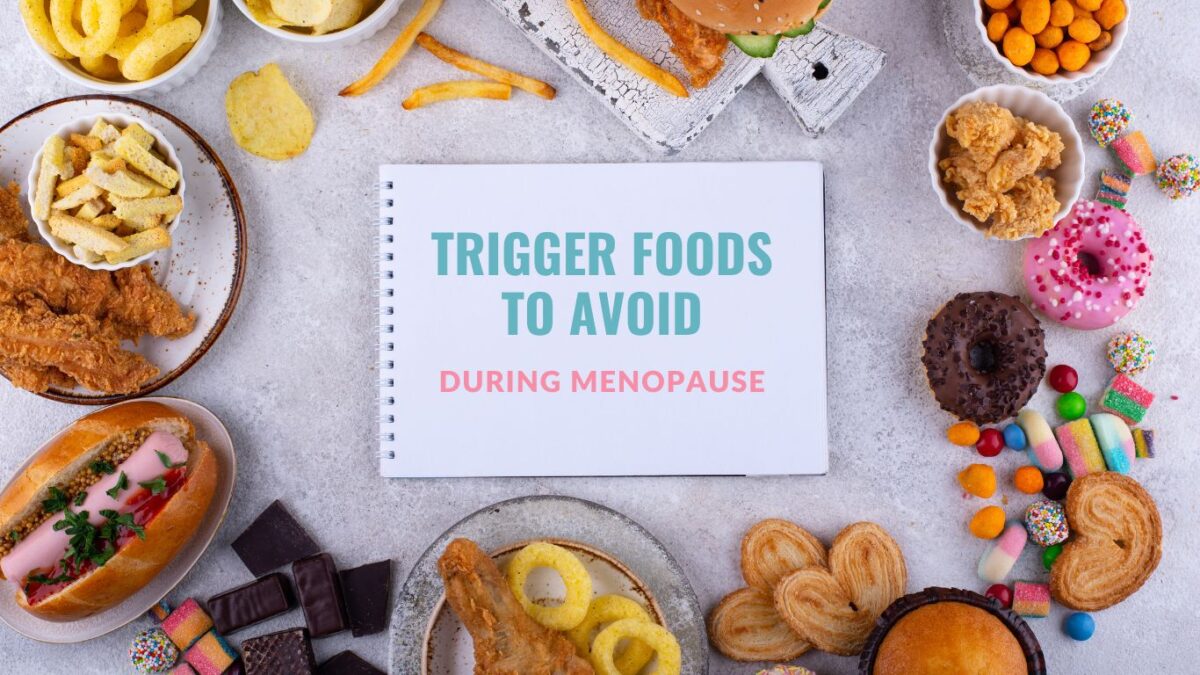10 Trigger Foods to Avoid During Perimenopause and Menopause
During perimenopause and menopause, hormone levels fluctuate and then decrease, which can result in a range of symptoms including hot flashes, night sweats, mood swings, and weight gain, among others. Some foods and drinks can exacerbate these symptoms. While every woman’s body is unique and may react differently, the following are commonly cited as potential “trigger” foods and beverages for menopausal symptoms:
- Caffeine: Found in coffee, tea, and some sodas, caffeine can trigger hot flashes in some women.
- Effect: Can increase heart rate and blood pressure, leading to feelings of anxiety or exacerbation of hot flashes.
- Reason: It stimulates the central nervous system and can alter sleep patterns, leading to insomnia, which many menopausal women already struggle with.
- Alcohol: Can lead to hot flashes and disrupt sleep. It can also have other health implications, so moderation is key.
- Effect: Known to induce hot flashes and disrupt the sleep cycle.
- Reason: Alcohol can increase body temperature and interfere with the body’s natural ability to regulate its internal thermostat. It can also interrupt the REM phase of sleep.
- Spicy Foods: These can sometimes exacerbate hot flashes.
- Effect: Can intensify hot flashes.
- Reason: They raise the body’s internal temperature, leading to an increased likelihood of experiencing a hot flash.
- Sugary Foods and Drinks: They can contribute to weight gain and mood swings. Sugar can also increase the risk of osteoporosis by leaching minerals from the bones.
- Effect: Can lead to mood swings, weight gain, and an increased risk of osteoporosis.
- Reason: Sugar causes rapid fluctuations in blood sugar levels, leading to mood swings. Additionally, excessive sugar consumption can result in weight gain and might negatively affect bone health by promoting mineral loss.
- Processed Carbohydrates: White bread, white rice, and pastries can cause rapid fluctuations in blood sugar, potentially intensifying mood swings.
- Effect: Rapid fluctuations in blood sugar can amplify mood swings.
- Reason: Processed carbs are broken down quickly in the body, leading to rapid spikes and subsequent drops in blood sugar levels, which can influence mood and energy.
- High-Sodium Foods: Excessive salt can lead to high blood pressure, which poses risks during menopause.
- Effect: Can exacerbate bloating and raise blood pressure.
- Reason: Sodium retains water in the body, leading to swelling or bloating. Excessive salt intake also increases the risk of hypertension.
- Soy: While some studies suggest that soy might help with menopause symptoms due to its phytoestrogen content, others indicate it might not be helpful or could exacerbate symptoms. The research is mixed, so women should monitor how their bodies react to soy.
- Effect: May exacerbate or relieve symptoms, depending on the individual.
- Reason: Soy contains phytoestrogens, plant-based compounds that mimic estrogen in the body. While some women find relief in these estrogen-like compounds, others may find that they exacerbate symptoms.
- Fatty Meats: These can contribute to weight gain and an increased risk of heart disease, which goes up after menopause.
- Effect: Contribute to weight gain and an increased risk of heart disease.
- Reason: Fatty meats are calorie-dense and can lead to weight gain if consumed in excess. Additionally, high saturated fat content is linked to heart disease, and postmenopausal women are at a higher risk for heart disease due to decreased estrogen levels.
- Dairy: Some women find that dairy exacerbates their symptoms. Also, while dairy is a source of calcium, which is important during menopause, some women may be lactose intolerant or sensitive.
- Effect: Can exacerbate symptoms in some women.
- Reason: Some women develop lactose intolerance or sensitivities as they age, leading to gastrointestinal discomfort. Additionally, while dairy is a source of calcium, excessive intake without balance can lead to other health issues.
- Artificial Sweeteners: Can cause bloating, gas, and other digestive issues in some people.
- Effect: May lead to digestive issues.
- Reason: Some people are sensitive to artificial sweeteners, experiencing symptoms like bloating, gas, or diarrhea.
Remember, the above are general guidelines and not all women will react to these foods in the same way. It’s essential to listen to one’s body and observe how it reacts after consuming certain foods. If a particular food seems to trigger symptoms, it may be beneficial to reduce or eliminate it and then see if symptoms improve.
In addition to being mindful of potential trigger foods, women going through perimenopause and menopause may also benefit from:
- Eating a balanced diet rich in whole foods.
- Maintaining a healthy weight.
- Getting regular exercise, which can help manage symptoms and improve bone density.
- Getting enough calcium and vitamin D to support bone health.
- Consulting with a healthcare professional about their specific needs and symptoms.
Always consult with a healthcare or nutrition professional when making significant changes to your diet, especially during a transitional phase like perimenopause or menopause.








